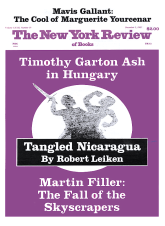In response to:
Strategy or Romance? from the July 18, 1985 issue
To the Editors:
Lord Zuckerman compressed a vast amount of nuclear wisdom into his recent NYR articles, showing once again the value of listening to those who, like Lord Zuckerman, Robert McNamara, George Ball, and McGeorge Bundy, forged their nuclear convictions in positions of great responsibility, near the center of power, at times of great stress.
The July piece, on Herken’s “Counsels of War” [NYR, July 18], is, in addition, entertaining. The demolishing of Dr. Herken, for anyone with a particle of sadism in his nature, can only be described as fun. My suggestion to Dr. Herken is that he lie there quietly in the center of the ring while the referee counts to ten.
My only substantial problem with Lord Zuckerman’s articles is his blanket insistence on the need to prevent all East–West hostilities, conventional and nuclear, rather than focusing specifically on nuclear war. In this, he makes the best the enemy of the good, or, more exactly, he makes the ideal the enemy of the absolutely essential.
In brief, extended deterrence has these dangerous defects:
—By threatening to introduce nuclears into conventional operations, it makes nuclear firing legitimate, a usable, normal—if ultimate—weapon. This irresistibly nuclearizes the strategy, doctrine and weapons of both sides. It demands hair-trigger alertness. It makes it overwhelmingly probable that any E–W hostilities would become nuclear.
—It produces “limited,” “war-fighting” plans and training which are militarily useless, and almost inevitably escalatory. Nuclear war once started is probably uncontrollable.
—By threatening to raise the stakes to the nuclear level, and thus threatening the destruction of the opponent’s nation, culture, and population, at our own initiative, it creates and perpetuates mortal hostility.
Sooner or later, in one crisis or another, through some misjudgment or misunderstanding or stupidity, or some unlimited dedication to some principle or purpose, absolute peace will fail. On that day, we must not be relying on nuclearized forces, armed and indoctrinated to use nuclear weapons when conventional elements get into trouble, at the highest pitch of nuclear readiness, pressing against their nuclear controls, and with no stopping point once nuclear war starts.
In brief, extended nuclear deterrence uses the nuclear threat to reduce the threat of conventional war only by accepting substantially increased risk of nuclear war. It counts on the nuclear weapon, the suicide threat, to deter all E–W hostilities at any significant level, and to deter them forever. And it promises only unimaginable disaster if that threat fails.
Preventing the appalling catastrophe of nuclear war must be our central objective. Nuclear retaliation, and only retaliation, against nuclear, and only nuclear, attack is the only role for nuclear forces. Conventional deterrence and conventional defense must be done with conventional forces. In Lord Zuckerman’s words, “The word ‘war’ cannot and should not be used in association with the term ‘nuclear.’ ” They are different phenomena.
John M. Lee, Vice Admiral
St. Petersburg, Florida
This Issue
December 5, 1985



